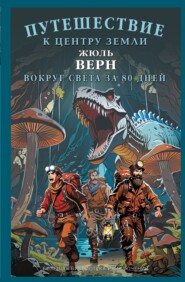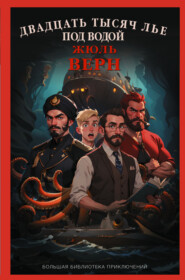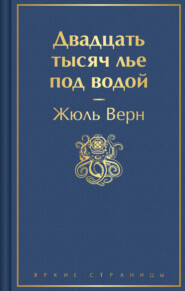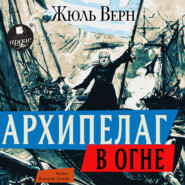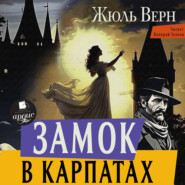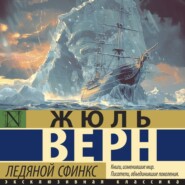По всем вопросам обращайтесь на: info@litportal.ru
(©) 2003-2024.
✖
Round the World in Eighty Days
Настройки чтения
Размер шрифта
Высота строк
Поля
Mr. Fogg replied that the honour would be his, and thereupon Fix, who had made up his mind not to lose sight of the other, requested permission to accompany Mr. Fogg in his walks about the city, which was granted.
So the three travellers soon found themselves in Montgomery Street, and on the outskirts of a great crowd. People were everywhere looking on and shouting, going about carrying large printed bills; flags, and streamers were waving, and everyone was calling out "Hurrah for Camerfield!" or "Hurrah for Maudiboy!"
It was a political meeting, at least Fix thought so; and said to Mr. Fogg that it might perhaps be better not to mingle with the crowd for fear of accidents.
Mr. Fogg agreed, and added "that blows, even though inflicted in a political sense, were nevertheless blows."
Fix smiled, and then in order to be able to see without being hustled, the three travellers mounted a flight of steps at the upper end of the street. Opposite was a large platform towards which the crowd appeared to be moving.
Mr. Fogg could not form any opinion as to what the meeting was about. Perhaps it was the nomination of a governor of a State, or of a member of Congress, which was not unlikely. Just then the excitement of the crowd became greater, fists were raised as if to register a vote by a show of hands. The crowd swayed backwards and forwards, flags were displayed and immediately torn to pieces, hats were smashed, and the greater part of the crowd seemed to have grown suddenly shorter.
"It is evidently a political meeting," said Fix; "perhaps it is about the Alabama Claims, although they are settled by this time."
"Perhaps it is," replied Mr. Fogg.
"At any rate," continued Fix, "here are the candidates. The Honourable Mr. Camerfield and the Honourable Mr. Maudiboy have met."
Aouda, leaning upon Mr. Fogg's arm, was regarding the tumult with curiosity, and Fix was about to ask the reason of the disturbance when the uproar increased to a terrific extent. The crowd became more excited, blows were exchanged, boots and shoes were sent whirling through the air, and the spectators thought they could hear the crack of revolvers mingling with the cries of men. The combatants approached the steps on which the party had taken refuge. One of the candidates had evidently been repulsed, but whether Camerfield or Maudiboy had got the best of it, mere spectators could not tell.
"I think we had better retire," said Fix; "if there is any discussion about England, and we were recognised, we might receive some injury."
"An Englishman – " began Mr. Fogg.
But he never finished the sentence, for a tremendous uproar arose on the terrace just behind them, and there were loud shouts for Maudiboy, a party of whose adherents were taking their opponents in the flank.
Our travellers were now between two fires; it was too late to escape; the torrent of men armed with life-preservers and sticks could not be withstood. Phileas Fogg and Fix did all they could to protect their fair companions with the weapons nature had provided, but unsuccessfully. A great ruffian, with a red beard, who appeared to be the chief of the band, was about to strike Mr. Fogg, and would probably have done him serious injury if Fix had not stepped in and received the blow in his stead, thereby getting his hat completely smashed.
"You low Yankee!" exclaimed Mr. Fogg contemptuously.
"You English beast!" replied the other.
"We shall meet again."
"Whenever you please."
"What is your name?"
"Phileas Fogg; and yours?"
"Colonel Stamp Proctor."
And the tide of humanity swept past, overturning Fix, who, however, speedily regained his feet, and though much dishevelled was not seriously hurt. His overcoat was torn in two, and his trousers were more like those worn by the Indians; but fortunately Aouda had escaped, and Fix only showed any traces of the encounter.
"Thank you," said Mr. Fogg to the detective when they were out of the crowd.
"Don't mention it," replied Fix; "let us go on."
"Where to?"
"To a tailor's."
In fact this course had become necessary, for the clothes of both men were torn as badly as if they had taken an active part in the contest, but in an hour they were newly clad and safely back at the hotel again.
There they found Passe-partout waiting and armed with a dozen six-barrelled central-fire revolvers. When he perceived Fix with Mr. Fogg he frowned, but when Mrs. Aouda had told him all that had passed his brow cleared. Fix evidently was no longer an enemy; he was an ally, and was adhering to his agreement.
After dinner they took a carriage and drove to the railway-station. As Mr. Fogg was getting into the cab he said to Fix, "Have you seen that Colonel Proctor since?"
"No," replied Fix.
"I will make a point of coming back to America to find him out," replied Fogg coolly. "It would never do for an Englishman to allow himself to be treated as he treated us."
The detective smiled, but made no reply. It was evident, however, that Mr. Fogg was of that race of Britons who, though they do not permit duelling at home, fight in foreign countries when their honour is in any way attacked.
At a quarter to six the travellers reached the railway-station, and found the train ready. Mr. Fogg called a porter and asked him the reason of the excitement that afternoon.
"It was a meeting, sir," replied the porter.
"I thought there was some great commotion in the streets."
"It was merely an election meeting."
"For a commander-in-chief, no doubt?" suggested Mr. Fogg.
"Oh dear no," replied the man. "It was for a justice of the peace."
On this reply Phileas Fogg entered the train, which started almost immediately.
CHAPTER XXVI
Showing how Mr. Fogg and Party journeyed in the Pacific Express.
"From ocean to ocean," as the Americans say, and this sentence is the usual expression to intimate the crossing of the continent by the Pacific Railway. That line is really divided into two, viz. the Central Pacific, between San Francisco and Ogden; and the Union Pacific, between Ogden and Omaha. There are five trunk-lines from Omaha to New York.
New York and San Francisco are thus united by a continuous iron road more than three thousand seven hundred and eighty-six miles in length; between the Pacific and Omaha the railroad traverses a country still inhabited by Indians and wild beasts, and a vast extent of territory which the Mormons began to colonise in 1845, when they were driven out from Illinois.
Formerly, under the most favourable circumstances, the journey from New York to San Francisco occupied six months, now it is accomplished in seven days.
It was in 1862 that, notwithstanding the opposition of Confederate members of Congress, who desired a more southerly route, the railroad track was planned between the forty-first and the forty-second parallels of latitude. President Lincoln himself fixed the termination of the new line at Omaha, in Nebraska. The work was immediately begun and continued with characteristic American energy, which is neither red-tapeish nor bureaucratic. The rapidity of the work did not affect its completeness; they laid a mile and a half of line across the prairie every day; an engine, carrying the rails to be used next day, ran on the line only just laid, and advanced as quickly as they were fixed.
The Pacific railroad has several branches in the States of Iowa, Kansas, Colorado, and Oregon. When it leaves Omaha the line runs along the left bank of the river Platte, as far as the mouth of the northern branch, follows the south branch, crosses the Laramine territory and the Wahsatch Mountains to Salt Lake City (the Mormon capital), plunges into the Tuilla Valley across the desert, Mounts Cedar and Humboldt, the Humboldt river and the Sierra Nevada, and then descends by Sacramento to the Pacific; the gradient all the way, even over the Rocky Mountains, not exceeding a hundred and twelve feet to the mile.
Such was the line along which Phileas Fogg hoped to be carried to New York in seven days in time to reach the Steamer to Liverpool on the 11th.
The car in which our travellers were seated was a sort of long omnibus, with four wheels at each end, without compartments; rows of seats were placed at each side, a passage running between them from end to end of this carriage, and practically of the train, for every carriage was closely connected with the next. There were drawing-room cars, smoking-cars, and restaurants. The only thing wanting was the theatre-car, but no doubt that will some day be supplied. Vendors of books and papers, eatables, drinkables, and tobacco, continually passed through the train.
The train started from Oakland Station at six p.m. It was already dark, and snow was threatening; the pace did not exceed twenty miles an hour, including stoppages. There was not much conversation amongst the passengers, and most of them soon went to sleep. Passe-partout was next to the detective, but did not address him, for after what had happened there could be no sympathy between them. Fix had not altered, but Passe-partout was extremely reserved, and on the least suspicion would have strangled his former friend.
In about an hour snow began to fall, but not sufficiently thick to hinder the progress of the train. Nothing could be seen from the windows but an immense white sheet, against which the steam of the engine looked gray.






